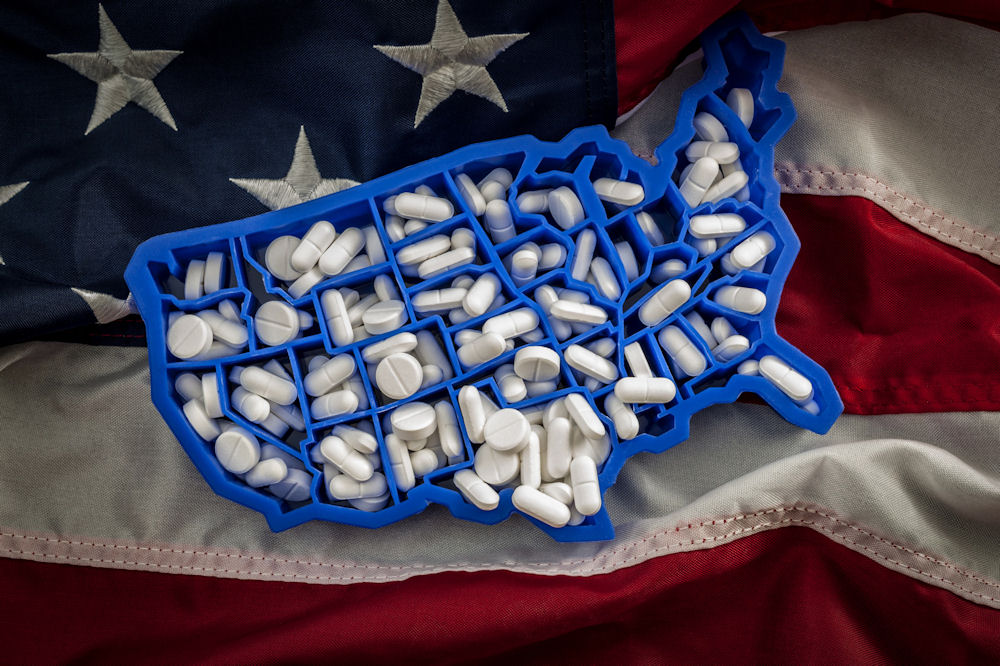Florida Drug Rehab for Opioid Addiction Treatment
The opioid epidemic is a serious problem throughout all of the United States, and Florida is no exception.
Opioid Addiction Treatment
The opioid epidemic is a serious problem throughout all of the United States, and Florida is no exception. As the nation faces the ongoing opioid crisis, there is a glimmer of hope, with recent statistics showing a decrease in opioid overdose deaths, from 84,181 in 2022 to 81,083 in 2023. At Ambrosia, we are committed to continuing this positive trend through our top-rated addiction treatment services.
This isn’t to say that all individuals who are prescribed opioids will suffer from addiction; however, the strength of this medication should not be underestimated. This is why opioid addiction treatment is imperative.
There are a plethora of opioid substance abuse treatment programs available at Ambrosia in West Palm Beach, Port St. Lucie, and Singer Island, Florida. With over a decade of experience and more than 10,000 success stories, Ambrosia is renowned for its exceptional care and innovative treatment strategies.
Our programs are uniquely designed to address both addiction and accompanying mental health issues, offering dual diagnosis and trauma treatment programs tailored to meet the needs of each individual. We take pride in our reputation for quality care, which is further validated by our partnerships with the NFL and leading university researchers.

The Opioid Epidemic
Opioid Addiction in Florida: An Overview
According to the National Institute on Drug Abuse, Florida has been severely impacted by the opioid crisis. There have been approximately 4,189 reported deaths involving opioids, which equates to a rate of 19.7 deaths per 100,000 persons. It’s difficult to estimate the exact number of people currently addicted to opioids in Florida; however, it’s clear that the issue is significant and widespread.
Additional Statistics Related to Opioid Abuse in Florida
- Florida’s opioid overdose rate has tripled since the turn of the century, reflecting a significant increase in opioid-related incidents over the years.
- In 2016, the state reported 4,672 unintentional and undetermined drug overdose deaths, more than doubling from 2,175 in 2014.
- The Prescription Drug Monitoring Program and the Pill Mill Law have been critical legislative measures in Florida’s fight against opioid abuse and misuse.
- Despite increased regulation of opioid prescriptions, opioid-involved drug overdose deaths continue to be a growing public health issue in Florida.
- In response to the opioid crisis, Florida was awarded a CDC Overdose Data to Action grant in 2019 to enhance drug overdose surveillance systems.
- Florida’s Department of Health recognizes the rising rate of opioid overdoses, with a particular focus on heroin and synthetic opioids such as illicitly manufactured fentanyl.
- Provisional data indicates there were 3,640 opioid-related deaths reported by the Florida Department of Law Enforcement’s Medical Examiners Commission.
- Florida’s legislative efforts include the passing of House Bill 249 in 2017, requiring reporting of controlled substance overdoses.
- The state’s enhanced surveillance system aims to monitor non-fatal drug overdose visits at Florida emergency departments and hospitals.

Why are Opioids Addictive?
Opioids are highly addictive due to their powerful effect on the brain’s reward system. These substances interact with opioid receptors in the brain, triggering a flood of dopamine. This surge of dopamine not only produces an intense feeling of euphoria but also reinforces the action of taking the drug. This establishes a cycle of reward and reinforcement. Over time, chronic use of opioids can lead to physical dependence and withdrawal symptoms, further perpetuating the cycle of addiction.
Signs and Symptoms of Opioid Addiction
- Drowsiness or lethargy
- Constricted pupils
- Nausea or vomiting
- Constipation
- Slurred speech
- Itching or flushed skin
- Increased secrecy or isolation
- Changes in social circles
- Neglecting responsibilities at work, school, or home
- Engaging in risky behaviors
- Doctor shopping to obtain more prescriptions
- Mood swings or irritability
- Anxiety or depression
- Euphoria followed by apathy
- Confusion or poor judgment
- Developing a tolerance, needing more of the drug to achieve the same effect
- Experiencing withdrawal symptoms when not using, such as muscle aches, insomnia, agitation, and sweating.

Recognizing these signs early can be crucial for seeking help and treatment.
Causes and Risk Factors of Opioid Abuse
Opioid use, particularly misuse, is influenced by a variety of factors. Genetic predisposition plays a significant role, with individuals having a family history of substance abuse being at a higher risk. Environmental factors, such as peer pressure and the availability of opioids, can also contribute to misuse.
Emotional stressors, including trauma or major depression and generalized anxiety, can further drive individuals towards opioid use as a form of self-medication. This is extremely dangerous as regular use can lead to dependence and when misused, opioid pain relievers can lead to addiction, overdose incidents, and deaths. Additionally, the misuse of prescription opioids can occur in the following scenarios:
- They are taken in a way or dose other than prescribed
- Taken by someone other than the person they were prescribed for
- Taken for the effect they cause – a feeling of being high

Types of Opioids
- Morphine
- Codeine
- Hydrocodone
- Oxycodone
- Fentanyl
- Heroin
Morphine is a powerful painkiller that falls under the category of opioid medications. Clinically, it is used in the management of severe acute and chronic pain. Derived from the opium poppy plant, morphine works by binding to receptors in the brain and spinal cord, blocking the perception of pain. While effective, its use can be associated with a risk of dependence and other side effects.
Codeine is a narcotic pain reliever and cough suppressant similar to morphine and hydrocodone. It acts on the central nervous system (CNS) to relieve pain. In addition to reducing pain, it also affects the brain to suppress cough. Codeine is prescribed by doctors typically when non-narcotic pain relievers have failed to provide relief. However, given its potential for addiction and misuse, it’s classified as a controlled substance in many countries.
Hydrocodone is an opioid medication used to treat severe pain of a prolonged duration if other measures are not sufficient. It is also used as a cough suppressant in adults. Hydrocodone is often combined with other non-opioid pain relievers (like acetaminophen) in various prescription medications. This potent substance can be habit-forming and should be used with caution due to potential risks of misuse and addiction.
Oxycodone is a prescription opioid analgesic that doctors prescribe to individuals who are experiencing moderate to severe pain. It works by changing the way the brain and nervous system react to pain. While effective in pain management, there is a potential risk for oxycodone dependence and addiction due to its ability to produce feelings of euphoria; because of this, oxycodone requires careful monitoring and regulation of its use.
Fentanyl is a powerful synthetic opioid analgesic that is similar to morphine but is 50 to 100 times more potent. It is a prescription drug that is also made and used illegally. Used medically, Fentanyl is often utilized to manage severe pain. It is particularly used after surgery or for patients with chronic pain who have developed a tolerance to other opioids. Illicitly produced Fentanyl has been a major contributor to the opioid crisis; it has also been a significant factor in overdose-related deaths worldwide.
Heroin is a highly addictive and illegal drug that is derived from morphine, a substance taken from opium poppy plants. It is typically sold as a white or brownish powder or as a sticky substance known as “black tar heroin”. The drug can be injected, smoked, or snorted, and it provides a rush of euphoria and feelings of relaxation and warmth. However, heroin is extremely dangerous and can quickly lead to physical dependence and severe health problems, including overdose and death.
How Do Opioids Affect the Brain and Body?

Why is it Important to be Aware of Opioid Addiction?
Awareness of opioid addiction (or opioid use disorder) is crucial due to its potential to cause serious harm to individuals, families, and communities. Opioids, while often prescribed for pain relief, carry a high risk of addiction and overdose. The consequences can be devastating, leading to physical health problems, mental health issues, financial strain, and even death. By understanding the risks and signs of addiction, people can intervene and seek appropriate treatment.
Diagnosis and Treatment for Opioid Addiction
Detoxification is often the first critical step in treating opioid use disorder, helping individuals safely manage withdrawal symptoms under medical supervision. At Ambrosia, the detox process is carefully monitored by a team of experienced healthcare professionals who provide round-the-clock care in a supportive and compassionate environment. With a focus on comfort and safety, Ambrosia’s detox program prepares clients for the next stages of their recovery journey, laying a strong foundation for lasting change.
Following detox, Residential treatment at Ambrosia offers a structured and immersive environment where clients can focus entirely on their recovery. This stage provides a comprehensive approach to addressing the underlying causes of addiction, with personalized treatment plans that include individual therapy, group counseling, and holistic therapies. Ambrosia’s residential program is designed to help clients develop essential coping skills and resilience, supported by a dedicated team of therapists and recovery specialists who guide them through each step of the process.
Outpatient treatment at Ambrosia serves as a flexible yet effective option for clients who have completed residential treatment or detox. This program allows individuals to continue their recovery journey while balancing everyday responsibilities, such as work or family obligations. Outpatient treatment includes regular therapy sessions, support groups, and educational workshops, all tailored to meet the unique needs of each client. Ambrosia’s outpatient program emphasizes continuity of care and ongoing support, ensuring that clients have access to the resources they need to maintain their progress and achieve long-term sobriety.
Medication-assisted treatment is a cornerstone in the treatment of opioid addiction, combining FDA-approved medications with counseling and behavioral therapies. At Ambrosia, MAT is integrated into a comprehensive treatment plan to reduce withdrawal symptoms and cravings, making it easier for clients to focus on their recovery. By using medications like buprenorphine and naltrexone, Ambrosia ensures a safer and more manageable transition away from opioid dependence, all under the careful supervision of their experienced medical team.
Cognitive Behavioral Therapy (CBT) is another critical component of Ambrosia’s opioid addiction treatment, focusing on identifying and changing negative thought patterns and behaviors. Through CBT, clients learn to develop healthier coping mechanisms and gain a deeper understanding of the triggers that contribute to their addiction. Ambrosia’s therapists work closely with clients to personalize CBT sessions, empowering them to make positive changes and build a foundation for long-term recovery.
Holistic therapy at Ambrosia offers a complementary approach to traditional treatments, addressing the physical, emotional, and spiritual aspects of addiction. This can include practices like yoga, meditation, and art therapy, which help clients reduce stress, enhance self-awareness, and promote healing. By incorporating holistic therapies into their programs, Ambrosia provides a well-rounded recovery experience that nurtures the whole person, helping clients find balance and peace in their sobriety journey.
In addition to these therapies, Ambrosia also offers family therapy, recognizing the vital role that family support plays in recovery. Family therapy sessions are designed to improve communication, rebuild trust, and strengthen relationships, creating a supportive network that can significantly enhance the recovery process. Ambrosia’s comprehensive approach ensures that each client receives the individualized care and support needed to overcome opioid addiction and achieve lasting wellness.
Opioid Abuse and Mental Health Disorders
- Chemical Changes in the Brain: Opioids alter the brain’s chemistry, affecting neurotransmitters that regulate mood and emotions. This can lead to mental health issues such as depression and anxiety.
- Psychological Dependence: The cycle of addiction can create stress, guilt, and shame, contributing to mental health issues. The constant need to obtain and use opioids can lead to anxiety and depression.
- Social and Environmental Factors: Addiction often leads to social isolation, financial problems, and strained relationships, which can worsen mental health conditions.
- Withdrawal Symptoms: The withdrawal process can be mentally taxing, causing symptoms like anxiety, depression, and irritability, which can persist even after detoxification.
There is also a strong link between opioid abuse and pre-existing mental health issues:
- Self-Medication: Individuals suffering from mental health issues may use opioids to self-medicate, seeking relief from symptoms like anxiety or depression, which can lead to substance abuse.
- Dual Diagnosis: Many people with opioid use disorder also have co-occurring mental health disorders, known as dual diagnosis. This requires integrated treatment approaches to address both issues simultaneously.
Understanding these connections is crucial for effective treatment, as addressing both addiction and mental health disorders can lead to better outcomes.

Our Opioid Addiction Treatment Center in West Palm Beach, FL Can Help
https://www.cdc.gov/nchs/pressroom/nchs_press_releases/2024/20240515.htm
https://www.healthvermont.gov/sites/default/files/document/dsu-monthly-opioid-report.pdf
https://www.floridahealth.gov/statistics-and-data/fl-dose/index.html
https://duval.floridahealth.gov/programs-and-services/preventoverdoseduval/od2a-data.html

Dr. Alam is an internationally renowned psychiatrist with academic affiliations with Northwestern University and University of Illinois, Chicago where he completed his residency training. He has been a principal investigator for over forty studies and has been involved in research leading to the approval of most psychiatric medications currently on the market. He is the founder of the Neuroscience Research Institute which continues to conduct research on cutting edge medication and interventional psychiatry. Dr. Alam is a Distinguished Fellow of the American Psychiatric Association and the American Society of Addiction Medicine. He has won several awards and has been featured extensively on radio and television.


